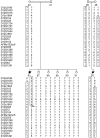Lethal congenital contractural syndrome type 2 (LCCS2) is caused by a mutation in ERBB3 (Her3), a modulator of the phosphatidylinositol-3-kinase/Akt pathway
- PMID: 17701904
- PMCID: PMC1950827
- DOI: 10.1086/520770
Lethal congenital contractural syndrome type 2 (LCCS2) is caused by a mutation in ERBB3 (Her3), a modulator of the phosphatidylinositol-3-kinase/Akt pathway
Abstract
Lethal congenital contractural syndrome type 2 (LCCS2) is an autosomal recessive neurogenic form of arthrogryposis that is associated with atrophy of the anterior horn of the spinal cord. We previously mapped LCCS2 to 6.4 Mb on chromosome 12q13 and have now narrowed the locus to 4.6 Mb. We show that the disease is caused by aberrant splicing of ERBB3, which leads to a predicted truncated protein. ERBB3 (Her3), an activator of the phosphatidylinositol-3-kinase/Akt pathway--regulating cell survival and vesicle trafficking--is essential for the generation of precursors of Schwann cells that normally accompany peripheral axons of motor neurons. Gain-of-function mutations in members of the epidermal growth-factor tyrosine kinase-receptor family have been associated with predilection to cancer. This is the first report of a human phenotype resulting from loss of function of a member of this group.
Figures




References
Web Resources
-
- Berkeley Drosophila Genome Project, http://www.fruitfly.org/seq_tools/splice-instrucs.html (for the Neural Networks Splice Site Prediction software)
-
- GenBank, http://www.ncbi.nlm.nih.gov/Genbank/ (forERBB3 [accession number NM_001982])
-
- InterPro, http://www.ebi.ac.uk/interpro/ (for the EMBL-EBI ERBB3 protein structure)
-
- Map Viewer, http://www.ncbi.nlm.nih.gov/mapview (for build 36)
References
-
- Gissen P, Johnson CA, Morgan NV, Stapelbroek JM, Forshew T, Cooper WN, McKiernan PJ, Klomp LW, Morris AA, Wraith JE, et al (2004) Mutations in VPS33B, encoding a regulator of SNARE-dependent membrane fusion, cause arthrogryposis-renal dysfunction-cholestasis (ARC) syndrome. Nat Genet 36:400–40410.1038/ng1325 - DOI - PubMed
Publication types
MeSH terms
Substances
Associated data
- Actions
LinkOut - more resources
Full Text Sources
Molecular Biology Databases
Research Materials
Miscellaneous

